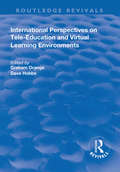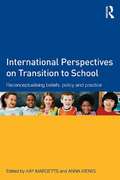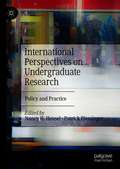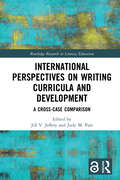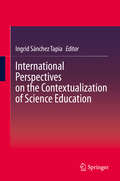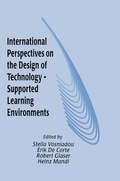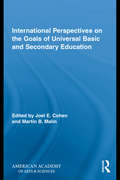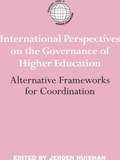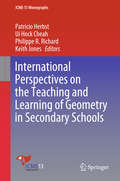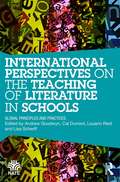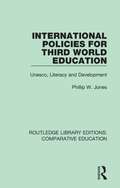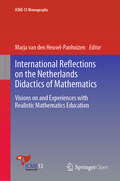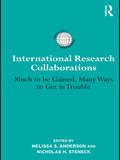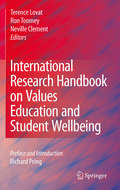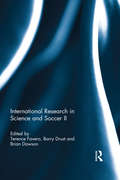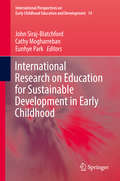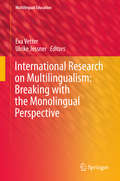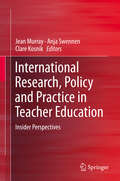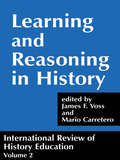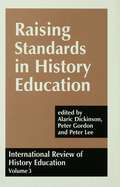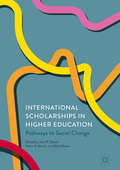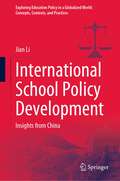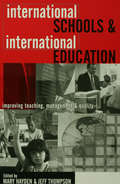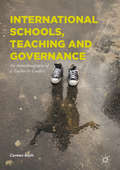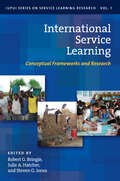- Table View
- List View
International Perspectives on Tele-Education and Virtual Learning Environments (Routledge Revivals)
by Graham Orange Dave HobbsThis title was first published in 2000: Teaching, learning and assessment methods are constantly evolving, providing the educator with a range of issues and new challenges. This book addresses these challenges through the use of information and communications technologies and presents a vision of how these may be deployed in the educational environments of the future.
International Perspectives on Transition to School: Reconceptualising beliefs, policy and practice
by Kay Margetts Anna KienigWith increasing attention given by governments and policy makers to children’s transition to school, and the associated need for educators, families and communities to be supported in the process, changes are often required to existing structures and pedagogy. This book is framed around the notion of transition as a time of change for those involved in the transition process and as a time for reconceptualising beliefs, policy and practice. It explores transition from a number of international perspectives and raises issues around the coherence of: how children perceive and respond to starting school; the roles and expectations of parents; developmental changes for parents; supporting children with diverse learning needs; how policy, curriculum and pedagogy are conceived and implemented. Readers will be informed about current practices and issues arising out of research in Europe, Scandinavia, the United Kingdom and Australia and will be stimulated to consider how they can change their own transition beliefs, policies and practices. Transition to school: Contemporary Perspectives and Change is essential reading for researchers and educators and anyone wanting to know more about the transition to school and how to support young children, their families and schools.
International Perspectives on Undergraduate Research: Policy and Practice
by Nancy H. Hensel Patrick BlessingerThis edited volume explores how undergraduate research and research-based teaching is being implemented in countries around the world. Leading educators come together to discuss commonly accepted definitions of undergraduate research, country-specific models and partnerships for student research, university policies and practices to support faculty and staff who engage students in research, and available assessment data that supports the effectiveness of undergraduate research as a means to increase student engagement and academic achievement. As undergraduate research has spread around the world, professors, administrators, and policymakers benefit by learning about other approaches and models of undergraduate research.
International Perspectives on Writing Curricula and Development: A Cross-Case Comparison (Routledge Research in Literacy Education)
by Jill V. Jeffery Judy M. ParrThis book contributes to the innovation of writing education and research globally by providing crucial insights into how the structures and aims of literacy curricula vary internationally. It examines how nine education systems across five continents represent ‘good writing’ in curricula that shape students’ experiences learning to write in school. The book presents curricular analyses aimed at providing insight into how writing development can be better supported through innovative policy and research. The findings regarding international variation are presented under three broad dimensions: social and contextual factors that shape writing curricula; the discourses of writing reflected in curricula and official documents; and hallmarks of classroom practice, including the relationship with official discourse. Case study chapters present integrated inductive and deductive document analyses, findings of which are compared in a concluding, cross-case analysis chapter. Offering a detailed comparative analysis of writing research, International Perspectives on Writing Curricula and Development will be of great interest to academics, researchers and students in the fields of education, literacy and curriculum studies. It will also be relevant reading for policymakers and curriculum designers.
International Perspectives on the Contextualization of Science Education
by Ingrid Sánchez TapiaThis book explores how science learning can be more relevant and interesting for students and teachers by using a contextualized approach to science education. The contributors explore the contextualization of science education from multiple angles, such as teacher education, curriculum design, assessment and educational policy, and from multiple national perspectives. The aim of this exploration is to provide and inspire new practical approaches to bring science education closer to the lives of students to accelerate progress towards global scientific literacy. The book presents real life examples of how to make science relevant for children and adolescents of diverse ethnic and language backgrounds, socioeconomic status and nationalities, providing tools and guidance for teacher educators and researchers to improve the contextualization and cultural relevance of their practice. The book includes rigorous studies demonstrating that the contextualization of science learning environments is essential for student engagement in learning science and practitioners' reflections on how to apply this knowledge in the classroom and at national scale. This approach makes this book valuable for researchers and professors of science education and international education interested in designing teacher education courses that prepare future teachers to contextualize their teaching and in adding a critical dimension to their research agendas.
International Perspectives on the Design of Technology-supported Learning Environments
by Robert Glaser Stella Vosniadou Erik De Corte Heinz MandlIn recent years, the use of technology for the purposes of improving and enriching traditional instructional practices has received a great deal of attention. However, few works have explicitly examined cognitive, psychological, and educational principles on which technology-supported learning environments are based. This volume attempts to cover the need for a thorough theoretical analysis and discussion of the principles of system design that underlie the construction of technology-enhanced learning environments. It presents examples of technology-supported learning environments that cover a broad range of content domains, from the physical sciences and mathematics to the teaching of language and literacy. The emphasis in this book is not on the design of educational software but on the design of learning environments. A great deal of research on learning and instruction has recently moved out of the laboratory into the design of applications in instructional settings. By designing technology-supported learning environments instructional scientists attempt to better understand the theories and principles that are explicit in their theories of learning. The contributors to this volume examine how factors such as social interaction, the creation of meaningful activities, the use of multiple perspectives, and the construction of concrete representations influence the acquisition of new information and transfer.
International Perspectives on the Goals of Universal Basic and Secondary Education (Routledge Research in Education)
by Joel E. Cohen Martin B. MalinAlthough universal schooling has been adopted as a goal by international organizations, bilateral aid agencies, national governments, and non-profit organizations, little sustained international attention has been devoted to the purposes or goals of universal education. What is universal primary and secondary education intended to accomplish? This book, which grew out of a project of the American Academy of Arts & Sciences, offers views from Asia, Africa, Europe, North America and South America on the purposes of universal education while considering diverse cultures, religions, and professions. It is the first book in which renowned authors from around the world have proposed, considered, and debated goals of basic and secondary education, engaging in a constructive dialogue on one of the most pressing issues facing education today.
International Perspectives on the Governance of Higher Education: Alternative Frameworks for Coordination (International Studies in Higher Education)
by Jeroen HuismanEssential reading for policy makers, institutional leaders, managers, advisors, and scholars in the field of higher education, International Perspectives on the Governance of Higher Education analyzes how the governance of higher education systems has evolved in recent years. This volume is an authoritative overview with contributions from authors from the U.K., the Netherlands, Denmark, Portugal, Norway, Italy, Ireland, Austria, Germany, Canada, the U.S. and Australia. Comprehensive in coverage, this volume explores how the use of disciplinary approaches and frameworks, particularly from political science, public administration and public policy help us to understand better the coordination of higher education systems. This is an arduous but gratifying challenge, given the current complexity of multi-actor and multi-level steering in higher education, rife with unintended outcomes and unanticipated dynamics. The edited volume looks to: The role of government, market and network steering in higher education systems. Governance in the knowledge society. How the use of disciplinary approaches help to better understand the steering policy processes and outcomes in higher education. Empirical studies exploring governance issues across systems and over time within systems.
International Perspectives on the Teaching and Learning of Geometry in Secondary Schools (ICME-13 Monographs)
by Keith Jones Patricio Herbst Ui Hock Cheah Philippe R. RichardThis book presents current perspectives on theoretical and empirical issues related to the teaching and learning of geometry at secondary schools. It contains chapters contributing to three main areas. A first set of chapters examines mathematical, epistemological, and curricular perspectives. A second set of chapters presents studies on geometry instruction and teacher knowledge, and a third set of chapters offers studies on geometry thinking and learning. Specific research topics addressed also include teaching practice, learning trajectories, learning difficulties, technological resources, instructional design, assessments, textbook analyses, and teacher education in geometry. Geometry remains an essential and critical topic in school mathematics. As they learn geometry, students develop essential mathematical thinking and visualization skills and learn a language that helps them relate to and interact with the physical world. Geometry has traditionally been included as a subject of study in secondary mathematics curricula, but it has also featured as a resource in out-of-school problem solving, and has been connected to various human activities such as sports, games, and artwork. Furthermore, geometry often plays a role in teacher preparation, undergraduate mathematics, and at the workplace. New technologies, including dynamic geometry software, computer-assisted design software, and geometric positioning systems, have provided more resources for teachers to design environments and tasks in which students can learn and use geometry. In this context, research on the teaching and learning of geometry will continue to be a key element on the research agendas of mathematics educators, as researchers continue to look for ways to enhance student learning and to understand student thinking and teachers’ decision making.
International Perspectives on the Teaching of Literature in Schools: Global Principles and Practices (National Association for the Teaching of English (NATE))
by Louann Reid Andrew Goodwyn Cal Durrant Lisa ScherffLiterature teaching remains central to the teaching of English around the world. This edited text brings together expert global figures under the banner of the International Federation for the Teaching of English (IFTE). The book captures a state-of-the-art snapshot of leading trends in current literature teaching, as well as detailing predicted trends for the future. The expert scholar and leading teacher contributors, coming from a wide range of countries with fascinatingly diverse approaches to literature teaching, cover a range of central and fundamental topics: literature and diversity; digital literatures; pedagogy and reader response; mother tongues; the business of reading; publishers, adolescent fiction and censorship; assessing responses to literature; the changing definitions of literature and multimodal texts. The collection reviews the consistently important place of literature in the education of young people and provides international evidence of its enduring value and contribution to education, resisting the functionalist and narrowly nationalist perspectives of misguided government authorities. International Perspectives on the Teaching of Literature in Schools will be of value to researchers, PhD students, literature scholars, practitioners, teacher educators, teachers and all those in the extensive academic community interested in English and literacy around the world.
International Policies for Third World Education: Unesco, Literacy and Development (Routledge Library Editions: Comparative Education #8)
by Phillip W. JonesOriginally published in 1988. Bringing the world close to universal literacy will be a major legacy of the twentieth century. But the rapid and widespread developments in education that have enabled this to happen have not taken place in a social and political vacuum. In some instances conditions conducive to mass literacy have only come about through popular revolution or rapid economic development, but a less spectacular and frequently less tangible role has been played by a number of international agencies. The most prominent of these is Unesco, which has had the goal of global literacy at the heart of its endeavours ever since its foundation in 1946. Agreement on the best means of achieving this goal, however, has been very difficult to come by, and Unesco's literacy program has been shaped by internal and external politics as well as by local exigencies. This book outlines how Unesco's literacy program has evolved, and by discussing how idealistic aims and intentions have been given shape and direction by more immediate political and bureaucratic concerns provides a critique, in miniature, of the post-war history of the United Nations and related organisations.
International Reflections on the Netherlands Didactics of Mathematics: Visions on and Experiences with Realistic Mathematics Education (ICME-13 Monographs)
by Marja van den Heuvel-PanhuizenThis open access book, inspired by the ICME 13 Thematic Afternoon on “European Didactic Traditions”, takes readers on a journey with mathematics education researchers, developers and educators in eighteen countries, who reflect on their experiences with Realistic Mathematics Education (RME), the domain-specific instruction theory for mathematics education developed in the Netherlands since the late 1960s. Authors from outside the Netherlands discuss what aspects of RME appeal to them, their criticisms of RME and their past and current RME-based projects. It is clear that a particular approach to mathematics education cannot simply be transplanted to another country. As such, in eighteen chapters the authors describe how they have adapted RME to their individual circumstances and view on mathematics education, and tell their personal stories about how RME has influenced their thinking on mathematics education.
International Research Collaborations: Much to be Gained, Many Ways to Get in Trouble (International Studies in Higher Education)
by Melissa S. AndersonEncouraged by their institutions and governments and aided by advances in technology and communication, researchers increasingly pursue international collaborations with high hopes for scientific breakthroughs, intellectual stimulation, access to research equipment and populations, and the satisfaction of global engagement. International Research Collaborations considers what can and does go wrong in cross-national research collaborations, and how scientists can avoid these problems in order to create and sustain productive, mutually-enriching partnerships. Unfamiliar approaches to training, legal and regulatory complications, and differences in funding and administration pose challenges for collaboration that are then compounded by the need to satisfy the requirements of different research systems. To help today’s international researchers create the best possible partnerships, chapters by funding officers, diplomats, attorneys, publishers, regulators, graduate students and postdocs, industry researchers, administrators, and scholars of responsible research address the following key trouble spots: how research is organized and funded the legal and normative environments of research differences in regulation and oversight variation in graduate education and postdoctoral training. International Research Collaborations will provide valuable insights to researchers who are collaborating or who intend to collaborate, as well as to administrators, funders, regulators, editors, and policy-makers involved in cross-national research.
International Research Handbook on Values Education and Student Wellbeing
by Terence Lovat Neville Clement Ron ToomeyInformed by the most up-to-date research from around the world, as well as examples of good practice, this handbook analyzes values education in the context of a range of school-based measures associated with student wellbeing. These include social, emotional, moral and spiritual growth - elements that seem to be present where intellectual advancement and academic achievement are being maximized. This text comes as 'values education' widens in scope from being concerned with morality, ethics, civics and citizenship to a broader definition synonymous with a holistic approach to education in general. This expanded purview is frequently described as pedagogy relating to 'values' and 'wellbeing'. This contemporary understanding of values education, or values and wellbeing pedagogy, fits well with recent neuroscience research. This has shown that notions of cognition, or intellect, are far more intertwined with social and emotional growth than earlier educational paradigms have allowed for. In other words, the best laid plans about the technical aspects of pedagogy are bound to fail unless the growth of the whole person - social, emotional, moral, spiritual and intellectual, is the pedagogical target. Teachers and educationalists will find that this handbook provides evidence, culled from both research and practice, of the beneficial effects of such a 'values and wellbeing' pedagogy.
International Research in Science and Soccer II
by Brian Dawson Terence Favero Barry DrustInternational Research in Science and Soccer II showcases the very latest research into the world’s most widely played sport. With contributions from scientists, researchers and practitioners working at every level of the game, from grassroots to elite level, the book covers every key aspect of preparation and performance, including: • performance and match analysis; • training and testing; • physiotherapy and injury prevention; • biomechanics; • youth development; • women’s soccer; • sport science and coaching; • sport psychology. Sports scientists, trainers, coaches, physiotherapists, medical doctors, psychologists, educational officers and professionals working in soccer will find this in-depth, comprehensive volume an essential and up-to-date resource. The chapters contained within this volume were first presented at The Fourth World Conference on Science and Soccer, held in Portland, Oregon, in June 2014 under the auspices of the World Commission of Science and Sports.
International Research on Education for Sustainable Development in Early Childhood
by John Siraj-Blatchford Cathy Mogharreban Eunhye ParkThis book offers a perspective on Education for Sustainable Development in Early Childhood (ESDEC) that is far removed from the 'business as usual' notion of an extended, predominantly environmental, educational curriculum for preschools. It presents a vision of sustainable development that has relevance to Early Childhood Care and Education (ECCE) from birth to school; it is relevant as much to homes, family support and health settings as it is to educational settings, and is as much concerned with health and wellbeing as with education. The book provides a perspective that is fundamentally embedded in notions of interdependency. It places an emphasis upon the importance of recognising the interdependency of peoples within and between nation states; the ecological interdependencies of the natural world; of humanity and nature; and most significantly the interdependency of adults and children. These emphases have their origins in the grassroots studies included in the ten chapters representing countries from around the world. The book reflects the idea that only global solutions and initiatives are capable of addressing the global challenges of climate change, environmental pollution, and global threats to ecological systems and biodiversity.
International Research on Multilingualism: Breaking with the Monolingual Perspective (Multilingual Education #35)
by Eva Vetter Ulrike JessnerThis volume contributes to a better understanding of both psycho- and sociolinguistic levels of multilingualism and their interplay in development and use. The chapters stem from an international group of specialists in multilingualism with chapters from Austria, Canada, Germany, Hungary, Israel, Italy, Slovakia, South Africa, Spain and the United States. The chapters provide an update on research on third language acquisition and multilingualism, and pay particular attention to new research concepts and the exploration of contact phenomena such as transfer and language learning strategies in diverse language contact scenarios. Concepts covered include dominant language constellations, mother tongue, germination factors and communicative competence in national contexts. Multilingual use as described and applied in the volume aims at demonstrating and identifying current and future challenges for research on third language acquisition and multilingualism. The third languages in focus include widely and less widely used official, minority and migrant languages in instructed and/or natural contexts, including Albanian, Arabic, Basque, English, French, German, Hungarian, Italian, Romanian, Spanish, Punjabi, Russian, Turkish, and Vietnamese, thereby mapping a high variety of language constellations.
International Research, Policy and Practice in Teacher Education: Insider Perspectives
by Jean Murray Clare Kosnik Anja SwennenThis unique book is an important source of information for all of those who educate future teachers and those who participate in teacher education as students, researchers, educators and policymakers. The volume also contributes to the international development of higher quality and research-led teacher education provision by providing clear evidence of policy impact. It draws on original research studies, conducted across eight countries in North America, Europe and Australia to analyse the impact of teacher education policy initiatives on ‘insiders’ in the fields, including education students, teacher educators and mentors in schools. In achieving this, the various chapters in the book analyse the commonalities and differentiations in the many policy reforms in teacher education currently being implemented by national governments. The book reveals some of the hidden consequences of these recent ‘reform’ efforts. It is also of use for leaders and policy makers in teacher education, providing them with insider perspectives from both theory and practice and making it possible for them to develop research-informed decisions that take into account the voices of insiders. Few texts have considered international policy trends alongside the impact they have had on significant stakeholder groups ‘inside’ teacher education. In redressing this omission, the book contributes to a better understanding of and improved practice of work in teacher education, both pre- and in-service.
International Review of History Education: International Review of History Education, Volume 2
by Mario Carretero James F. VossThis volume consists of the proceedings of an international conference on cognition and instruction in history. The papers cover several areas: historical narratives and history teaching; the use of texts, documents and images in learning history; and historical explanation and understanding.
International Review of History Education: International Review of History Education, Volume 3 (Woburn Education Series)
by Peter Lee Peter Gordon Alaric DickinsonThe third volume in this international review takes "raising standards" as its central theme. Raising standards is no simple matter, either conceptually or empirically, whatever politicians might think. If it is to happen, it must draw on research and practical experience from other countries.
International Scholarships in Higher Education
by Joan R. Dassin Robin R. Marsh Matt MawerThis book explores the multiple pathways from scholarships for international study to positive social change. Bringing together studies from academic researchers, evaluators and program designers and policymakers from Africa, Asia, Latin and North America, Europe, and Australia, the book compiles the latest research and analysis on the policy, practice, and outcomes of international scholarship programs. Contributions examine the broad trends in sponsored overseas study, program design considerations, the dynamics of the immediate post-scholarship period and the impact of scholarships on international education and development. Particular attention is focused on assessment and evaluation, the complexities of selecting awardees, the dynamics of returning home and concerns about brain drain and the state of knowledge and research on long-term outcomes of international scholarships with social change aims. nt>
International School Policy Development: Insights from China (Exploring Education Policy in a Globalized World: Concepts, Contexts, and Practices)
by Jian LiThis book investigates the international school policy reform in China from various perspectives. In recent years, international schools, international classes, international departments, and various international education projects have emerged in the field of education in China. This book explores and analyzes the idea of international schools, and discusses different aspects of the conceptual model of international education policy development in China, including international school policy, student cultivation, teacher cultivation, school management, curriculum, and quality assessment of international schools. In addition, this book offers a comprehensive, systematic, and practical perspective on shaping China’s international school policy development and management. This book serves as a guide for scholars and researchers who are interested, and work in, research on internationalization development in China, administrators, and stakeholders in China's education system, and graduate students who major or minor in the field of internationalization development in China.
International Schools and International Education: Improving Teaching, Management and Quality
by Mary Hayden Jeff ThompsonThis work tackles the issues that staff and management of international schools need to address in order to ensure that their teaching and organization is of a high standard and quality. It contains a wide range of contributions from international school experts around the world.
International Schools, Teaching and Governance
by Carmen BlythThis book examines how injustice based on social positioning is performed within the context of international schools. Drawing on the lived experiences of an international school teacher, it proposes and explores the notion that teachers, in being constituted and positioned as subordinate within the hierarchy that is the international school, leads to their being wronged on three counts: epistemically for being wrongfully mistrusted; ethically for being wrongfully excluded; and ontologically for being wrongfully positioned as a lesser human being. The book addresses the dearth of research currently available on conflict in international schools and how conflict between teachers and administrators is dealt with in and by such institutions. It will be valuable reading for students and teachers of education and sociology, and those interested in the workings of international schools.
International Service Learning: Conceptual Frameworks and Research
by Robert G. Bringle Julie A. Hatcher Steven G. JonesInternational Service Learning (ISL) borrows from the domains of service learning, study abroad, and international education to create a new pedagogy that adds new and unique value from this combination. It is a high-impact pedagogy with the potential to improve students’ academic attainment, contribute to their personal growth, and develop global civic outcomes. The international service experience provides opportunities for additional learning goals, activities, and relationships that are not available in a domestic service learning course or in a traditional study abroad course. The service experience develops reflection while shedding light on and providing an added dimension to the curricular component of the study abroad course. The international education component further broadens students’ perspectives by providing opportunities to compare and contrast North American and international perspectives on course content.This book focuses on conducting research on ISL, which includes developing and evaluating hypotheses about ISL outcomes and measuring its impact on students, faculty, and communities. The book argues that rigorous research is essential to improving the quality of ISL’s implementation and delivery, and providing the evidence that will lead to wider support and adoption by the academy, funders, and partners. It is intended for both practitioners and scholars, providing guidance and commentary on good practice. The volume provides a pioneering analysis of and understanding of why and under what conditions ISL is an effective pedagogy.Individual chapters discuss conceptual frameworks, research design issues, and measurement strategies related to student learning outcomes; the importance of ISL course and program design; the need for faculty development activities to familiarize faculty with the component pedagogical strategies; the need for resources and collaboration across campus units to develop institutional capacity for ISL; and the role that community constituencies should assume as co-creators of the curriculum, co-educators in the delivery of the curriculum, and co-investigators in the evaluation of and study of ISL. The contributors demonstrate sensitivity to ethical implications of ISL, to issues of power and privilege, to the integrity of partnerships, to reflection, reciprocity, and community benefits
